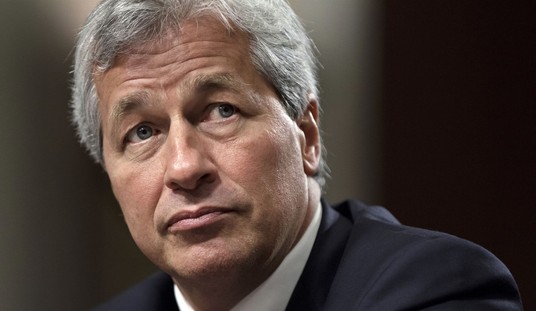New York Times building by wsifrancis, licensed under CC BY-SA 2.0/Original
If you’ve been wondering why the issue of racism is nearly omnipresent these days — the accusation is thrown around so randomly and casually, and usually because of some degree of separation from Donald Trump, that even Jay-Z is getting the treatment for partnering with the NFL. I mean…Jay-Z — Slate has their hands on a leaked audio transcript from The New York Times’ recent “crisis town hall” you might want to see.
It paints a picture of the very scary reality conservatives knew we were living but were forced to discuss in hushed tones to avoid accusations of wearing tinfoil hats to bed: the urban media elites have a very real power to control — to quite literally make up if they want — the national conversation.
In this case, the national conversation is about the pervasiveness of racism. And it’s tearing the country apart. Not that The Times cares much.
The audio transcript describes how the Times’ newsroom, fresh off of failing to sell the Russia collusion narrative (because it never happened), methodically and strategically decided to shift their focus to a new fabrication: Trump’s racism (and I’m basing this opinion off people who might know more about it than I, like Dr. Alveda King and Sen. Tim Scott).
The town hall itself was held in response to the upheaval created by the demotion of an editor because he suggested, very inelegantly, certain leaders and legislators may not be of the same mind as the people they claim to represent. The Times also took some grief (from readers apparently) when their White House correspondent broke ranks (which was, frankly, a miracle) and said perhaps doxing campaign donors was a bridge too far. The Times corrected her story.
Tough times at the Gray Lady when the lockstep groupthink veneer shows cracks. So what did tribalists at The Times do? Why they decided on a new editorial direction that everyone could (must) agree on. That editorial direction was simple: Donald Trump, and anyone who so much as agrees with him on any policy whatsoever, forever and ever, amen, are officially racists and white supremacists.
[New York Times executive editor Dean] Baquet, in his remarks, seemed to fault the complaining readers, and the world, for their failure to understand the Times and its duties in the era of Trump. “They sometimes want us to pretend that he was not elected president, but he was elected president,” Baquet said. “And our job is to figure out why, and how, and to hold the administration to account. If you’re independent, that’s what you do.”
This is the key piece of the transcript from Baquet’s own remarks (emphasis Legal Insurrection):
Dean Baquet: If we’re really going to be a transparent newsroom that debates these issues among ourselves and not on Twitter, I figured I should talk to the whole newsroom, and hear from the whole newsroom. We had a couple of significant missteps, and I know you’re concerned about them, and I am, too. But there’s something larger at play here. This is a really hard story, newsrooms haven’t confronted one like this since the 1960s. It got trickier after [inaudible] … went from being a story about whether the Trump campaign had colluded with Russia and obstruction of justice to being a more head-on story about the president’s character. We built our newsroom to cover one story, and we did it truly well. Now we have to regroup, and shift resources and emphasis to take on a different story. I’d love your help with that. As Audra Burch said when I talked to her this weekend, this one is a story about what it means to be an American in 2019. It is a story that requires deep investigation into people who peddle hatred, but it is also a story that requires imaginative use of all our muscles to write about race and class in a deeper way than we have in years. In the coming weeks, we’ll be assigning some new people to politics who can offer different ways of looking at the world. We’ll also ask reporters to write more deeply about the country, race, and other divisions. I really want your help in navigating this story.
As Legal Insurrection rightly notes, this is big deal because “it shows the most powerful news organization in the country congratulating itself for setting the anti-Trump narrative on Russia collusion, and seamlessly transitioning to setting a narrative of Trump as racist after collusion flopped.”
Byron York over at The Washington Examiner notes the effort by the Times to inject the specter of race into everything fits into a broader project the publication has undertaken called the 1619 Project . That editorial project literally seeks to inject race into everything by trying to shift people’s perception of the founding of the country from the Revolutionary War era to “understanding 1619 as our true founding, and placing the consequences of slavery and the contributions of black Americans at the very center of the story we tell ourselves about who we are.”
In order to frame that new editorial direction (and keep their advertisers), making race the issue on everyone’s lips daily — and making the hated GOP president the literal embodiment of it — is crucial for The Times and they know it.
“I’m wondering to what extent you think that the fact of racism and white supremacy being sort of the foundation of this country should play into our reporting,” one staffer asked Baquet. “Just because it feels to me like it should be a starting point, you know? Like these conversations about what is racist, what isn’t racist, I just feel like racism is in everything. It should be considered in our science reporting, in our culture reporting, in our national reporting.”
The staffer’s point brought Baquet back to the paper’s new initiative. “One reason we all signed off on The 1619 Project and made it so ambitious and expansive was to teach our readers to think a little bit more like that,” Baquet said. “Race in the next year … is going to be a huge part of the American story. And I mean, race in terms of not only African Americans and their relationship with Donald Trump, but Latinos and immigration.”
Race is going to be a huge part of the American story because it would appear The New York Times means to sell it by reporting on the race angle in every story they write. There’s a better than decent chance that the people outside The Times’ readership are exhausted by the constant need to point out the things that divide Americans, but The Times doesn’t care.
It’s going to be racism, racism, racism for the foreseeable future. And while that’s more than a little depressing, take heart: at least it’s becoming clearer and clearer how we’re being manipulated.















Join the conversation as a VIP Member